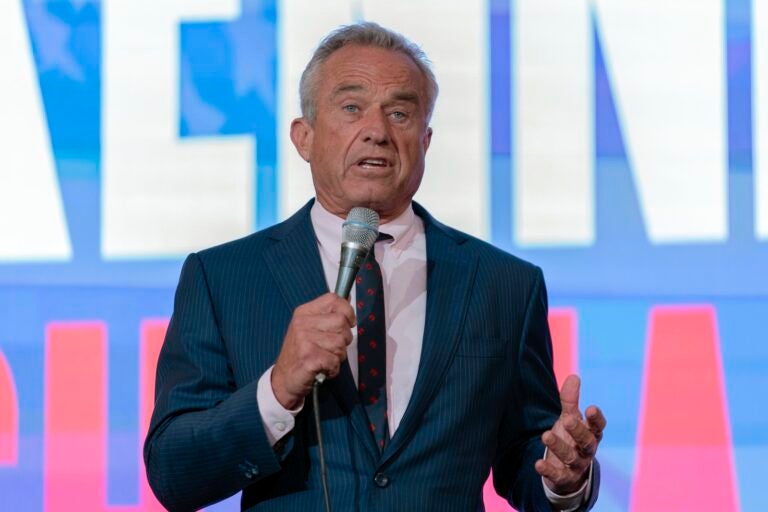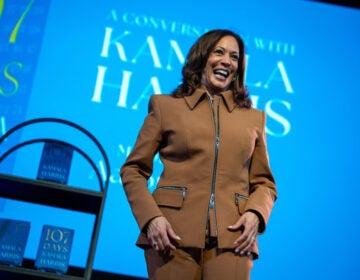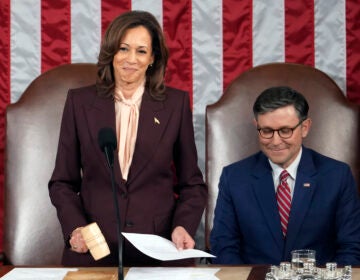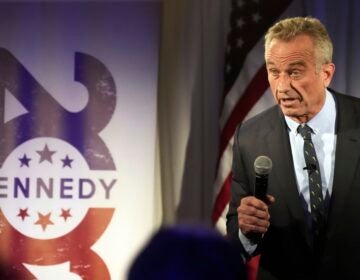RFK Jr. showed up late to court in Pa. It could cost him a spot on the ballot
A pair of voters from Dauphin and Philadelphia counties argue Robert F. Kennedy Jr. misrepresented his residency and failed to meet signature requirements.
Listen 0:59
Independent presidential candidate Robert F. Kennedy Jr. speaks during the Libertarian National Convention at the Washington Hilton in Washington, May 24, 2024. (AP Photo/Jose Luis Magana, File)
What questions do you have about the 2024 elections? What major issues do you want candidates to address? Let us know.
Ballot access cases in Pennsylvania move fast. The challenge to Robert F. Kennedy Jr.’s spot on the ballot might have been too swift for the We the People candidate for president.
Kennedy showed up nearly two hours late to his hearing Tuesday morning in Harrisburg. Timothy J. Ford, an attorney representing the objectors, and Kennedy’s legal team both had already rested their cases.
As a result, Judge Lori Dumas barred Kennedy from testifying in the case. Ford — a Philadelphia-based attorney who represents Alexander Reber and Janneken Smucker, a pair of voters from Dauphin and Philadelphia counties who are challenging Kennedy’s nomination papers — said the judge was unhappy with Kennedy’s tardiness Tuesday.
As party leaders flock to Chicago for the Democratic National Convention, Democrat-aligned forces in the Keystone State are moving to shove Kennedy and his running mate Nicole Shanahan off the ballot.
Reber and Smucker filed an objection to Kennedy’s nomination papers on Aug. 8 with the Commonwealth Court.
Clear Choice Action, a super PAC intended to disrupt third-party candidates who pose a threat to a Democratic White House, is supporting the petitioners.
Ford said he expects a ruling within days.
“This is not the kind of case where we wait one month — three months for a judge’s decision,” Ford said. “The judges have to move fast too so we can get these ballots finalized.”
Kennedy’s campaign directed WHYY News to a lengthy video he posted to X, formerly known as Twitter, Tuesday evening. In the video, Kennedy said he was late for court because his flight was canceled. He criticized the effort as part of a larger scheme to upend his campaign.
“They’re suing me all over the country to try and keep me off the ballot,” Kennedy said. “Unfortunately in some of these states, we’re running into judges who are highly politicized and are very, very sympathetic — let me put it that way — to the DNC.”
My father and my uncle were members of a Democratic Party that was at the forefront of making sure that every American could vote for the candidate they wanted to.
— Robert F. Kennedy Jr (@RobertKennedyJr) August 21, 2024
Today’s Democratic Party is doing the opposite. pic.twitter.com/6K3XZ7bXsj
Why is RFK Jr.’s nomination facing scrutiny from Pa. voters?
Ford said his clients assert Kennedy’s nomination is invalid for two reasons.
“We argue that RFK has misrepresented his residency in his nomination papers and his candidate affidavit,” Ford said. “And that’s a required part of the nomination papers that have to be put in front of the voters before they decide whether they want to sign RFK’s nomination papers to put him on the ballot or not.”
Kennedy claims to live in New York. Ford said he lives in California.
Ford also argued Kennedy also failed to meet the voter signature threshold required by third-party candidates in Pennsylvania.
“Under the election code, third parties are required to turn in a number of signatures from registered voters equal to 2% of the highest vote total received by a statewide candidate in the last election,” Ford said.
This year, if Kennedy were to adhere to those guidelines, he needed to collect about 33,000 signatures. He submitted about 23,000 signatures.
“But there was litigation in federal court in the mid-2010s that said that higher threshold in combination with a threat of costs from other parts of the election code were unconstitutional as to the Green Party, the Constitution Party and the Libertarian party,” Ford said.
As such, the Pennsylvania Department of State’s guidelines require third-party candidates to obtain just 5,000 signatures for statewide ballot access. He believes Kennedy doesn’t face the same burdens and subsequently can’t benefit from that decision.
In addition to being barred from testifying in the case, Kennedy also received an “adverse inference” from the judge regarding the constitutionality of the signature requirement. This means the court drew a negative conclusion against his case because of his failure to submit evidence.
So, even if Kennedy had shown up on time, the judge decided Kennedy would not have been able to argue his position.
Shanahan took to X to criticize Clear Choice, calling it “the most undemocratic, anti-American PAC in the game.”
Clear Choice PAC—the most undemocratic, anti-American PAC in the game—has been suing our campaign in nearly every major jurisdiction with frivolous lawsuits to get us removed from the ballots. Seventy-one percent of Americans want a viable third-party choice. The American public,…
— Nicole Shanahan (@NicoleShanahan) August 20, 2024
Harrell Kirstein, a contact for Clear Choice, did not immediately respond to a request for comment.

Get daily updates from WHYY News!
WHYY is your source for fact-based, in-depth journalism and information. As a nonprofit organization, we rely on financial support from readers like you. Please give today.





